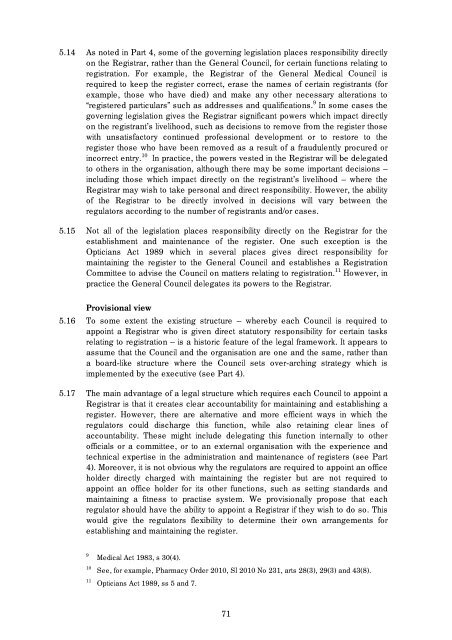Regulation of Health and Social Care Professionals Consultation
Regulation of Health and Social Care Professionals Consultation
Regulation of Health and Social Care Professionals Consultation
You also want an ePaper? Increase the reach of your titles
YUMPU automatically turns print PDFs into web optimized ePapers that Google loves.
5.14 As noted in Part 4, some <strong>of</strong> the governing legislation places responsibility directly<br />
on the Registrar, rather than the General Council, for certain functions relating to<br />
registration. For example, the Registrar <strong>of</strong> the General Medical Council is<br />
required to keep the register correct, erase the names <strong>of</strong> certain registrants (for<br />
example, those who have died) <strong>and</strong> make any other necessary alterations to<br />
“registered particulars” such as addresses <strong>and</strong> qualifications. 9 In some cases the<br />
governing legislation gives the Registrar significant powers which impact directly<br />
on the registrant’s livelihood, such as decisions to remove from the register those<br />
with unsatisfactory continued pr<strong>of</strong>essional development or to restore to the<br />
register those who have been removed as a result <strong>of</strong> a fraudulently procured or<br />
incorrect entry. 10 In practice, the powers vested in the Registrar will be delegated<br />
to others in the organisation, although there may be some important decisions –<br />
including those which impact directly on the registrant’s livelihood – where the<br />
Registrar may wish to take personal <strong>and</strong> direct responsibility. However, the ability<br />
<strong>of</strong> the Registrar to be directly involved in decisions will vary between the<br />
regulators according to the number <strong>of</strong> registrants <strong>and</strong>/or cases.<br />
5.15 Not all <strong>of</strong> the legislation places responsibility directly on the Registrar for the<br />
establishment <strong>and</strong> maintenance <strong>of</strong> the register. One such exception is the<br />
Opticians Act 1989 which in several places gives direct responsibility for<br />
maintaining the register to the General Council <strong>and</strong> establishes a Registration<br />
Committee to advise the Council on matters relating to registration. 11 However, in<br />
practice the General Council delegates its powers to the Registrar.<br />
Provisional view<br />
5.16 To some extent the existing structure – whereby each Council is required to<br />
appoint a Registrar who is given direct statutory responsibility for certain tasks<br />
relating to registration – is a historic feature <strong>of</strong> the legal framework. It appears to<br />
assume that the Council <strong>and</strong> the organisation are one <strong>and</strong> the same, rather than<br />
a board-like structure where the Council sets over-arching strategy which is<br />
implemented by the executive (see Part 4).<br />
5.17 The main advantage <strong>of</strong> a legal structure which requires each Council to appoint a<br />
Registrar is that it creates clear accountability for maintaining <strong>and</strong> establishing a<br />
register. However, there are alternative <strong>and</strong> more efficient ways in which the<br />
regulators could discharge this function, while also retaining clear lines <strong>of</strong><br />
accountability. These might include delegating this function internally to other<br />
<strong>of</strong>ficials or a committee, or to an external organisation with the experience <strong>and</strong><br />
technical expertise in the administration <strong>and</strong> maintenance <strong>of</strong> registers (see Part<br />
4). Moreover, it is not obvious why the regulators are required to appoint an <strong>of</strong>fice<br />
holder directly charged with maintaining the register but are not required to<br />
appoint an <strong>of</strong>fice holder for its other functions, such as setting st<strong>and</strong>ards <strong>and</strong><br />
maintaining a fitness to practise system. We provisionally propose that each<br />
regulator should have the ability to appoint a Registrar if they wish to do so. This<br />
would give the regulators flexibility to determine their own arrangements for<br />
establishing <strong>and</strong> maintaining the register.<br />
9 Medical Act 1983, s 30(4).<br />
10 See, for example, Pharmacy Order 2010, SI 2010 No 231, arts 28(3), 29(3) <strong>and</strong> 43(8).<br />
11 Opticians Act 1989, ss 5 <strong>and</strong> 7.<br />
71
















